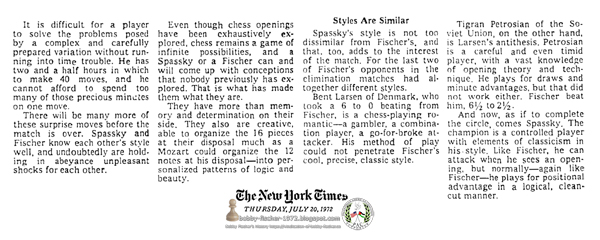New York Times, New York, New York, Thursday, July 20, 1972 - Page 30
Spassky and Fischer Play With Intense Drive to Win by Harold C. Schonberg
Reykjavik, Iceland, July 19 — As they say in poker, the players came to play.
Boris Spassky and Bobby Fischer have confronted each other over the board only three times in the world championship chess match, but it is clear that both the titleholder and the challenger are fighting for the points and are not likely to settle for “grandmaster draws.”
In a grandmaster draw, the players — perhaps tired, perhaps bored, perhaps wanting a day off, perhaps just throwing courage to the wind — play a dozen or so routine moves and, after an hour, agree to split the point.
Fischer, with his will to win, seldom offers or accepts a draw in any case. And Spassky, playing for the defense of his title, for his honor and what he considers the honor of the Soviet people, is in no mood to take the easy way out. ([Reported from an interview in 1985 with Boris Spassky, “Many observers thought Fischer's furor sapped (his, Spassky's]) concentration, but Spassky says the job was done by Moscow.”])
Fischer's refusal to play the second game because of the presence of ([disruptive crews of men, disruptively operating large, bulky]) television cameras in Exhibition Hall resulted in a forfeit to Spassky ([which the actual rules clearly stated Fischer was well within his right to protest, if the disruptive camera men became a distraction to either player, reserving right to demand their removal! Rules, which were flagrantly broken by organizers]). As a result, Spassky, who won the first game ([due to Fischer being distracted by disruptive camera men]) and lost the third, is leading by 2½ to 1½.
Yesterday's draw showed the keen rivalry. It was a brilliant and exciting game, far more than the game Fischer won from Spassky. In that game, Spassky was completely outplayed and never had much of a chance.
In last night's game, however, Spassky, playing the black pieces, sacrificed a pawn and launched an attack that had Fischer continually on the defensive.
In short, Spassky was not playing the defensive kind of game that the player of the black pieces usually adopts. Nor did Fischer play the usual kind of hold-the-line game in the third meeting. Playing black, he sprang a little-known move on the champion and then swarmed all over him when Spassky did not find the correct over-the-board solution.
In both cases, those moves were undoubtedly prepared variations. Chess players are continually searching for new lines.
Spassky spent seven months preparing for Fischer, undoubtedly aided by a phalanx of Soviet grandmasters.
There are about 90 grandmasters in the world, almost half of them in the Soviet Union and it is safe to assume that many worked with Spassky.
Fischer must have done the same, though he was unaided by any of the nine other grandmasters of his country. He prefers to work alone.
Thus when Spassky offered the pawn last night, or when Fischer in the third game let Spassky double his kingside pawn structure, those moves were not idle maneuvers but novelties that had been carefully plotted in advance.
It is difficult for a player to solve the problems posed by a complex and carefully prepared variation without running into time trouble. He has two and a half hours in which to make 40 moves, and he cannot afford to spend too many of those precious minutes on one move.
There will be many more of these surprise moves before the match is over. Spassky and Fischer known each other's style well, and undoubtedly are holding in abeyance unpleasant shocks for each other.
Even though chess openings have been exhaustively explored, chess remains a game of infinite possibilities, and a Spassky or a Fischer can and will come up with conceptions that nobody previously has explored. That is what has made them what they are.
They have more than memory and determination on their side. They also are creative, able to organize the 16 pieces at their disposal much as a Mozart could organize the 12 notes at his disposal—into personalized patterns of logic and beauty.
Styles Are Similar
Spassky's style is not too dissimilar from Fischer's, and that, too, adds to the interest of the match. For the last two of Fischer's opponents in the elimination matches had altogether different styles.
Bent Larsen of Denmark, who took a 6 to 0 beating from Fischer, is a chess-playing romantic—a gambler, a combination player, a go-for-broke attacker. His method of play could not penetrate Fischer's cool, precise, classic style.
Tigran Petrosian of the Soviet Union, on the other hand, is Larsen's antithesis. Petrosian is a careful and even timid player, with a vast knowledge of opening theory and technique. He plays for draws and minute advantages, but that did not work either. Fischer beat him, 6½ to 2½.
And now, as if to complete the circle, comes Spassky. The champion is a controlled player with elements of classicism in his style. Like Fischer, he can attack when he sees an opening, but normally—again like Fischer—he plays for positional advantage in a logical, clean-cut manner.


























